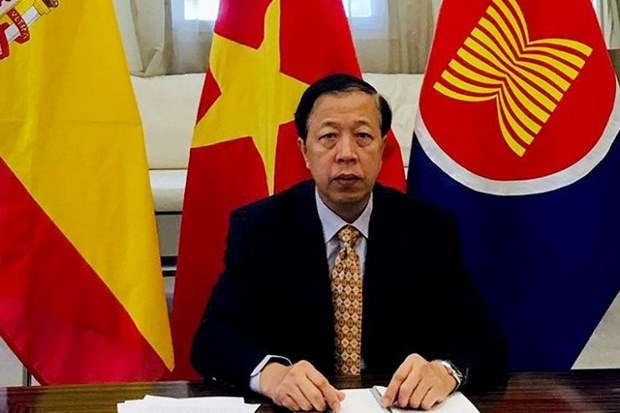Vietnam, Spain seek stronger strategic partnership
VOV.VN -Deputy Prime Minister Tran Luu Quang’s visit to Spain from March 1 to March 3 will contribute to carrying out the Vietnamese foreign policy of independence, self-reliance for peace, friendship, co-operation, development, multilateralization, and diversification of external ties.

Vietnamese Ambassador to Spain Hoang Xuan Hai made the statement in a recent media interview held to discuss the significance of the first visit to Spain by a Vietnamese Government leader since 2017 due to the COVID-19 pandemic.
During the course of the visit, the two sides will spend time to review the bilateral relationship over recent years and reach a consensus on specific measures aimed at removing obstacles, as well as discussing new co-operation mechanisms in priority areas. This includes basic infrastructure, green energy, climate change response, and water resource management towards carrying forward bilateral strategic partnership in the near future, Minister Hai said.
According to details given by the Vietnamese diplomat, friendly co-operation between Vietnam and Spain has continued to improve over the past 46 years. Indeed, Spain was the first EU country to establish a strategic partnership with Vietnam back in December, 2009.
The country has become the main ASEAN trading partner of Spain with more than US$3 billion on average each year. Last year alone witnessed Vietnamese exports to Spain exceeded EUR4 billion, equivalent to US$4.2 billion, while importing more than EUR525 million from the European country. However, Spanish investment in the Vietnamese market remains modest, with 88 projects valued at more than US$143 million.
The Ambassador expressed his hope that with the validity of the EU-Vietnam Free Trade Agreement (EVFTA) and the approval of the EU-Vietnam Investment Protection Agreement in late January, 2022, firms from the two countries will tap into the benefits brought about by the two deals to turn economic ties into a solid pillar in their relationship.
In his view, the two governments, ministries, and agencies should consider amending or signing new agreements in a bid to create a legal framework for bilateral ties, particularly in the fields of their strength such as infrastructure, renewable energy, digital transformation, green technology, climate change response, hi-tech agriculture, health care, education-training, culture, sports, and tourism.
In the immediate future, both sides should soon resume and launch several important co-operation mechanisms, such as deputy ministerial-level political consultations and the first meeting of the Bilateral Cooperation Committee for Trade and Investment, thereby reaching a consensus on measures and roadmaps aimed at elevating bilateral ties to a higher level, he stated.
